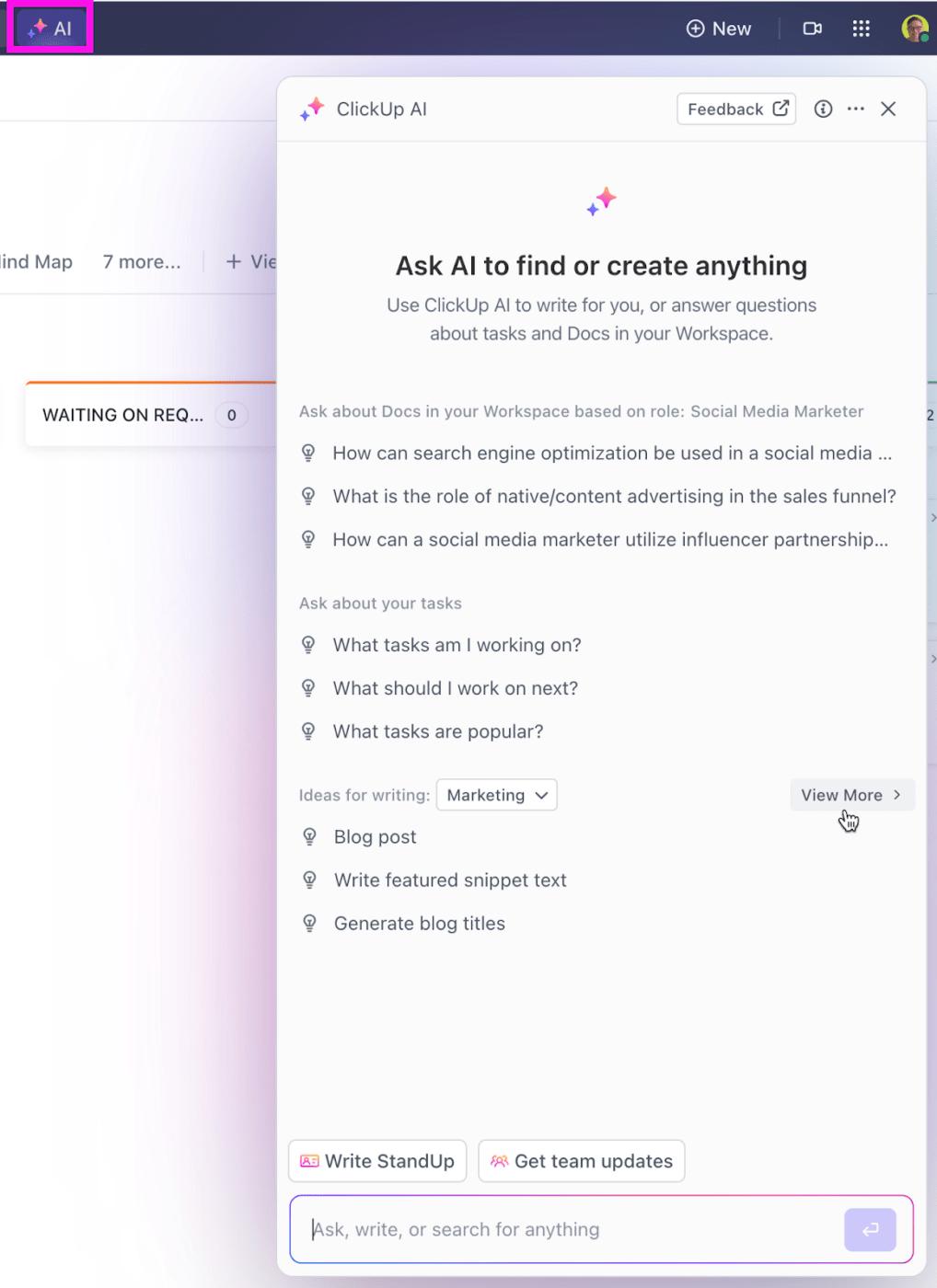How to Create a Company AI Policy (+ Template)

Sorry, there were no results found for “”
Sorry, there were no results found for “”
Sorry, there were no results found for “”
A Deloitte survey found that 75% of companies have begun testing generative artificial intelligence technologies, 65% use them internally, and 31% use them for external consumption.
Chances are you’re one of them or on the path to adopting AI technologies.
In either case, if you’re concerned about data privacy and the ethical implications when using AI for company work—you’re in good company. Data privacy, data poisoning, and serious ethical risks are some of the most pressing concerns when using GenAI technologies.
In such a scenario, how do you ensure the transparent, responsible, and ethical use of AI technologies and position your company for future success?
Read this guide to discover how to create an effective AI policy for your company.
An AI company policy is a document that outlines the guidelines and protocols for the ethical and responsible implementation of AI technologies in a company. This framework ensures AI is used safely, ethically, and strategically to achieve your business goals.
Creating an AI policy for your company is a powerful step towards empowerment and control. It can also lead to increased customer trust, improved efficiency, and a competitive edge in the market.
Let’s explore why this policy is a crucial tool for your business.
An AI policy is a commitment to maintaining ethical standards. It ensures that AI technologies are developed, deployed, and used in a way that aligns with societal norms and business values, fostering a sense of responsibility and commitment in your company.
By embedding ethical considerations into AI governance, An AI policy upholds ethical standards of:
It’s no secret that bad actors use AI technologies for nefarious purposes, including cyber attacks, malware, automated hacking, and more. As concerns about AI’s potential misuse continue to rise, governments worldwide are starting to establish guidelines to regulate the use of AI.
For example, the European Union has built the world’s most comprehensive AI law—the AI Act—that will regulate the use of artificial intelligence in the coming months. This act provides rules for assessing different levels of risks posed by AI systems. It also prescribes rules for developing and using AI technologies in enterprises.
The White House, too, has released a guide—Blueprint for an AI Bill of Rights—to protect US citizens from the threats posed by the improper use of AI technology. This blueprint outlines five principles that should inform the designing, deployment, and use of AI-powered systems in the US. These five principles are:
An AI policy helps you navigate the complex legal landscape surrounding AI technologies. It ensures compliance with relevant regulations, applicable laws, industry standards governing data privacy, and intellectual property rights. It ultimately helps protect your company against legal pitfalls and your consumers from AI-based attacks.
With AI redefining job roles and workplace dynamics, a clear AI policy for companies can help employees adapt to your company’s AI-driven changes, providing them with the support and guidance they need.
This helps employees grasp their evolving job roles, carry out tasks with AI, and effectively utilize these technologies for their work.
The policy also supports employee development through structured training programs. These programs equip employees with the skills, resources, and support they need to adapt and grow in the AI landscape. As a result, an AI policy cultivates a sense of empowerment and promotes professional growth.
A well-designed AI policy is pivotal in cultivating an ethical and inclusive workplace. It sets clear standards for AI use, particularly in sensitive areas like recruitment and performance evaluation, and actively works to mitigate various biases—such as gender, racial, age, socioeconomic, disability, cultural, educational, and confirmation biases.
This promotes equality in your company and ensures that all employees receive fair and equitable treatment.
Your customers expect swift and personalized service. An AI policy helps you meet these customer expectations with ease. It guarantees that each interaction, whether through a chatbot or recommendation system, strikes the ideal balance between efficiency and personalization.
A well-thought-through AI policy fosters customer loyalty by ensuring a consistent brand experience. Every AI interaction becomes an extension of your business, faithfully reflecting your brand voice, personality, and values. This digital ambassadorship strengthens your brand at every customer touchpoint.
In addition to loyalty, it helps you build customer trust. Customers who are aware of your AI policy know their interactions with AI (within your organization’s purview) are fair, transparent, and secure because an AI policy protects against the potential misuse of customer data and safeguards customer information.
A well-designed AI policy helps you create customer-centric AI experiences that genuinely understand and respond to customer needs, desires, and feedback.
Now that you’ve become familiar with the benefits of an AI policy, here are the steps to creating your own AI policy:
Effective AI policy creation requires input from diverse perspectives. Build a group of stakeholders, department heads, business executives, legal and HR representatives, and technical experts. Ensure that tall group members have a foundational understanding of AI and its benefits and risks.
Assess progress across areas and identify repetitive tasks and bottlenecks that could benefit from automation. After conducting a thorough needs assessment, determine the policy’s purpose and what you aim to achieve with this policy.
For example, is it to promote ethical and responsible AI use, improve efficiency, or ensure compliance? Establishing the purpose will shape the direction of the policy.
Identify the specific business areas where AI will be applied. Consider whether to adopt an enterprise-wide AI strategy or focus on particular domains such as data analysis, customer service, or other functions. Once the scope is defined, select the appropriate AI tools and technologies to support the chosen applications.
Collaboratively define the policy’s essential elements. The requirements could be:
After deciding on the requirements, establish guidelines and protocols. This will help you shape the must-dos and must-nots for AI usage in your company and mitigate potential risks.
Create guidelines for training employees. Offer workshops or online modules tailored to different roles within your organization. Set up a variety of training resources and procedures that employees can use.
Determine the people responsible for overseeing the implementation and enforcement of the generative AI policy in your company. Establish an AI governance structure with clear accountability mechanisms.
For example, you can appoint a Chief AI Officer, form a cross-functional AI ethics committee, or use GRC software to monitor compliance, handle ethical dilemmas, and manage risks around AI.
Develop procedures for continuous monitoring and periodic review of AI systems and policy effectiveness. By investing in these processes, organizations can reap the benefits of AI while mitigating risks and building a strong foundation for responsible AI development.
For example, you can set up a review board and take regular employee feedback. This will help you update the policy in response to reviews and feedback.
Collate information from the above steps and create a draft of the policy. Here’s an overview of all the points your draft should cover:
After drafting the policy, seek feedback from stakeholders and legal advisors. Address any identified gaps and revise and refine the policy to ensure it is clear, legally compliant, and enforceable. Submit the policy to the board of directors or senior management for approval. Upon receiving their endorsement, distribute the policy to all employees and start integrating AI technologies within the company.
Follow these strategies while creating a corporate AI policy:
An effective AI policy often involves input from various departments, including legal, HR, IT, and operations. Coordinating these stakeholders can be challenging. A versatile AI tool for project management like ClickUp can streamline policy creation, collaboration, and management.
ClickUp offers features designed to simplify writing procedures and implement AI guidelines. Let’s examine these features.
ClickUp Brain is a suite of AI features that allow you to better manage the initial stages of AI policy drafting. Use it for brainstorming and idea generation in AI policy research. ClickUp Brain can suggest relevant keywords, broaden the research scope, and help identify potential policy focus areas.
💡 Pro Tip: Don’t want to read lengthy research reports when drafting your AI policy? Leverage ClickUp Brain to summarize the documents and create critical points.

Use ClickUp Brain as a productivity tool to quickly:
You can access ClickUp Brain on any smart device—mobile phones, iPads, or laptops—regardless of operating system or location.
Moreover, the data you input into ClickUp Brain remains safe and protected. ClickUp has obtained licensing that ensures your company-sensitive data remains private and cannot be used for training AI models.

💡 Pro Tip: Use ClickUp Brain’s AI tool to translate policies into multiple languages, ensuring accessibility for diverse language groups within your company.
ClickUp Docs allows you to collaborate in real time with stakeholders, department heads, legal representatives, and many others. It also enables you to draft the AI policy directly within the document.
Draft and store the policy document in a dedicated ClickUp Doc, ensuring everyone can access the current version. Grant appropriate permissions to relevant stakeholders for easy access and collaboration, and maintain a clear record of policy evolution for compliance and accountability purposes.

Use ClickUp Docs to:
Also read: How to use AI for documentation
With ClickUp Templates, you have in your hands a faster, easier way to craft your company AI policy document. You can find templates ranging from company policy and process documentation templates to SOP and governance templates. Let’s explore some of the top policy-related templates in detail.
The ClickUp Employee Handbooks, Policies, and Procedures Template helps you create an extensive document to communicate your company’s expectations, policies, and procedures to your employees. Similar to an SOP template, this framework allows you to outline employee job roles and rights, minimize confusion and misunderstandings, and create a safe work environment.
The ClickUp Policy Memo Template allows you to initiate a new course of action or introduce policy changes with ease. You can use this as an AI policy template to help you create comprehensive memos that outline how to interpret and implement different AI policies in your company.
Company policy templates like these help you ensure that employees are up-to-date with your company’s policies and adhere to its rules and regulations.
The ClickUp Process and Procedures Template allows you to manage your processes in one place. With this template, you can easily set up and track your processes. Use it to establish standardized processes for working on tasks, organize procedures with Kanban boards, reduce costly errors, and improve accuracy and efficiency.
Creating a well-thought-out AI policy for companies can be challenging and time-consuming, but it’s a critical part of running a technologically-forward business today.
Leveraging AI project management tools such as ClickUp can streamline and expedite the process. Use its diverse range of features to ensure you draft an AI policy that is well-researched, comprehensive, relevant, and actionable.
Sign up with ClickUp and create a comprehensive company AI policy with ease.
© 2026 ClickUp